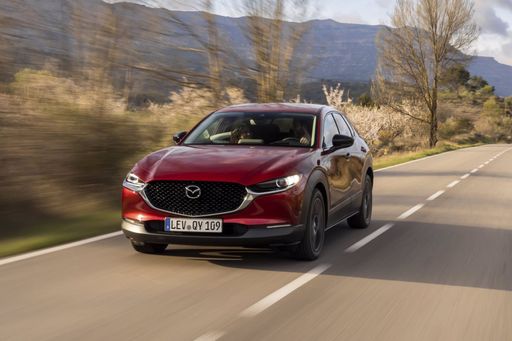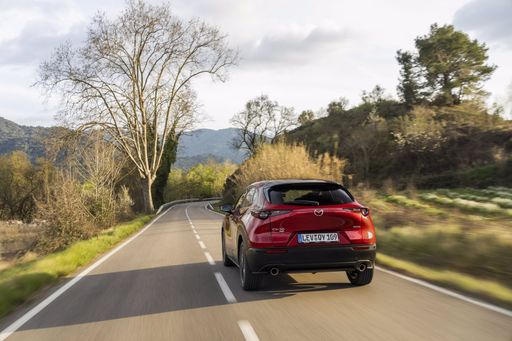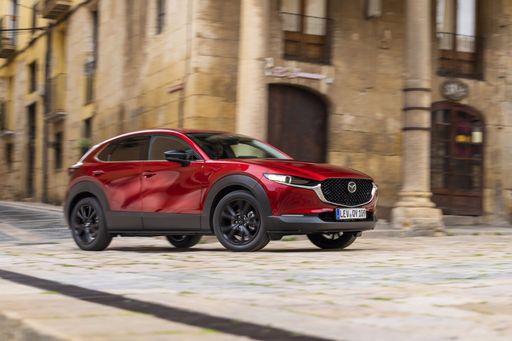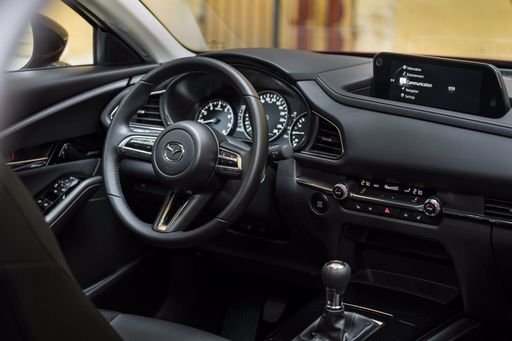Hyundai Kona VS Mazda CX-30
Hyundai Kona
The Hyundai Kona blends a bold design with a versatile interior, making it a standout choice in the compact SUV market. Its crisp handling and responsive steering provide an engaging driving experience, whether in the city or on the open road. The vehicle also offers a range of features designed to enhance comfort and connectivity, ensuring a pleasurable journey for both driver and passengers.
more informationMazda CX-30
The Mazda CX-30 effortlessly combines sleek design with a sense of adventure, making it an appealing choice for urban explorers and countryside enthusiasts alike. Inside, the cabin is thoughtfully designed, offering both comfort and cutting-edge technology to enhance the driving experience. Its performance on the road is agile, providing a smooth and engaging journey for drivers and passengers.
more information @ hyundai.news
@ hyundai.news
 @ hyundai.news
@ hyundai.news
 @ hyundai.news
@ hyundai.news
 @ hyundai.news
@ hyundai.news
 @ de.mazda-press.com
@ de.mazda-press.com
 @ de.mazda-press.com
@ de.mazda-press.com
 @ de.mazda-press.com
@ de.mazda-press.com
 @ de.mazda-press.com
@ de.mazda-press.com
Costs and Consumption |
|
|---|---|
|
Price
about 22600 - 41600
£
|
Price
about 24800 - 36300
£
|
|
Consumption L/100km
4.5 - 6.7
L
|
Consumption L/100km
5.7 - 6.6
L
|
|
Consumption kWh/100km
14.6 - 16.8
kWh
|
Consumption kWh/100km
-
|
|
Electric Range
377 - 514
km
|
Electric Range
-
|
|
Battery Capacity
1.3 - 65.4
kWh
|
Battery Capacity
-
|
|
co2
128, 103, 141, 152, 0
g/km
|
co2
129 - 148
g/km
|
|
Fuel tank capacity
38 - 47
L
|
Fuel tank capacity
48 - 51
L
|
Dimensions and Body |
|
|
Body Type
SUV
|
Body Type
SUV
|
|
Seats
5
|
Seats
5
|
|
Doors
5
|
Doors
5
|
|
Curb weight
1370 - 1773
kg
|
Curb weight
1455 - 1587
kg
|
|
Trunk capacity
466
L
|
Trunk capacity
422 - 430
L
|
|
Length
4350 - 4385
mm
|
Length
4395
mm
|
|
Width
1825
mm
|
Width
1795
mm
|
|
Height
1580 - 1585
mm
|
Height
1540
mm
|
|
Payload
420 - 490
kg
|
Payload
458 - 496
kg
|
Engine and Performance |
|
|
Engine Type
Petrol, Full Hybrid, Electric
|
Engine Type
Petrol MHEV
|
|
Transmission
Manuel, Automatic
|
Transmission
Manuel, Automatic
|
|
Transmission Detail
Manual Gearbox, Automat. Schaltgetriebe (Doppelkupplung), Reduction Gearbox
|
Transmission Detail
Manual Gearbox, Automatic Gearbox
|
|
Drive Type
Front-Wheel Drive, All-Wheel Drive
|
Drive Type
Front-Wheel Drive, All-Wheel Drive
|
|
Power HP
100 - 218
HP
|
Power HP
140 - 186
HP
|
|
Acceleration 0-100km/h
7.8 - 13.3
s
|
Acceleration 0-100km/h
8.3 - 10.3
s
|
|
Max Speed
162 - 208
km/h
|
Max Speed
191 - 204
km/h
|
|
Torque
200 - 265
Nm
|
Torque
238 - 240
Nm
|
|
Number of Cylinders
3 - 4
|
Number of Cylinders
4
|
|
Power kW
74 - 160
kW
|
Power kW
103 - 137
kW
|
|
Engine capacity
998 - 1598
cm3
|
Engine capacity
1998 - 2488
cm3
|
|
Top speed
162 - 208
km/h
|
Top speed
191 - 204
km/h
|
General |
|
|
Model Year
2024
|
Model Year
2024
|
|
CO2 Efficiency Class
D, C, E, A
|
CO2 Efficiency Class
D, E
|
|
Brand
Hyundai
|
Brand
Mazda
|
Hyundai Kona
The Hyundai Kona: A Comprehensive Overview
The Hyundai Kona has established itself as a standout in the compact SUV segment, blending innovation with performance and style. As the automotive world moves towards more sustainable and efficient options, the Kona offers a variety of powertrains, from traditional petrol engines to full hybrids and all-electric models.
Powertrain Options and Performance
The Hyundai Kona's powertrain choices cater to a wide range of preferences. For petrol enthusiasts, the Kona offers a 1.0L T-GDI engine, delivering 100 PS, and a more robust 1.6L T-GDI variant with up to 170 PS. Those looking for efficiency without sacrificing power can consider the full hybrid model, offering 129 PS and an impressive consumption of 4.5 L/100km.
For a greener option, the all-electric Kona provides a compelling case. With battery capacities of up to 65.4 kWh, the electric Kona offers power outputs of 156 to 218 PS, and efficiencies as low as 14.6 kWh/100km, enabling an electric range of up to 513 km.
Technical Specifications and Innovations
Built on a robust platform, the Kona delivers versatility and reliability. With a choice between manual or dual-clutch automatic gearboxes, along with options for front-wheel or all-wheel drive, the Kona ensures a tailored driving experience. The handling is enhanced by the car's lightweight construction, balancing a 1370 to 1773 kg curb weight with dynamic performance.
The Kona's design doesn't compromise cargo space for style; it offers a generous 466 L boot capacity. With a relatively compact body, measuring 4350 to 4385 mm in length, the Kona easily navigates urban environments while still commanding a strong road presence with its 1825 mm width.
Efficiency and Eco-Friendliness
Hyundai is committed to reducing emissions, as evidenced by the Kona's CO2 efficiency ratings, which range from class A for electric models to class D for some higher-performance petrol variants. The focus on reducing environmental impact without sacrificing driving pleasure is notable throughout the Kona range.
Costing and Value
The Hyundai Kona offers commendable value for money. Pricing starts at €26,400 and reaches up to €50,690, depending on the chosen configuration. The monthly running costs range from €956 to €1090, with a cost per kilometre of 38.3 to 43.6 cents, making it a competitive option in its class.
Conclusion: Modern, Efficient, and Versatile
The Hyundai Kona stands as a testament to Hyundai's commitment to innovation, efficiency, and practicality. Whether you are inclined towards a traditional combustion engine, a hybrid for a balance of power and efficiency, or a full electric model for maximum eco-friendliness, the Kona provides a tailored solution for each unique driver preference.
Mazda CX-30
The Mazda CX-30: Where Innovation Meets Efficiency
The Mazda CX-30 stands as a testament to Mazda's commitment to blending the best of technology and design. Positioned as a subcompact SUV, the CX-30 delivers the practicality of an SUV with the agile driving dynamics of a smaller vehicle. As we delve into its technical and innovative aspects, the CX-30 showcases why it's a formidable choice in today's competitive automotive market.
Engine and Performance: Power Meets Efficiency
The heart of the Mazda CX-30 lies in its sophisticated engine offerings. At its core, the e-SKYACTIV-X engines provide a unique balance of performance and fuel efficiency. With 186 PS at your disposal, these engines optimise the combustion process, reducing both fuel consumption and emissions. The engine's mild-hybrid system further enhances its efficiency by capturing energy during braking, making it one of the more environmentally conscious choices on the market.
Transmission and Drivetrain Options
Buyers have the flexibility to choose between a manual or an automatic transmission, catering to diverse driving preferences. The available all-wheel drive (AWD) system provides enhanced stability and control, particularly useful in variable weather conditions or challenging terrains. Those preferring a classic driving experience can opt for the front-wheel drive (FWD) variants, which still deliver impressive traction and handling.
Design and Dimensions
The Mazda CX-30's dimensions—4395 mm in length and 1795 mm in width—offer a spacious and comfortable interior while maintaining a sleek and modern exterior design. Its aerodynamic form not only enhances its aesthetic appeal but also contributes to improved performance and fuel efficiency. The interior, adorned with high-quality materials, reflects Mazda’s dedication to creating a premium driving experience.
Interior Comfort and Technology
Inside, the CX-30 does not disappoint. With a cabin that seats five comfortably, it strikes an excellent balance between style and practicality. The infotainment system, replete with intuitive controls and connectivity options, ensures that drivers remain connected and entertained on the go. Additionally, advanced safety features bolster the confidence of any journey, safeguarding occupants and pedestrians alike.
Pricing and Model Variants
The Mazda CX-30 is offered in a variety of model configurations, each catering to different budgetary and feature preferences. The entry-level models provide excellent value, while higher trims, such as the Exclusive-Line and Takumi, offer luxurious enhancements and additional technology features. With pricing from €28,940 to €42,390, the CX-30 positions itself as an attractive option in its segment.
Conclusion: The Ideal Mix of Performance and Practicality
In summary, the Mazda CX-30 emerges as a versatile and appealing option for those seeking a compact SUV that does not compromise on performance or sophisticated engineering. Its combination of innovative technology, efficient powertrains, and driver-centric features make it a worthy contender in its class. Whether navigating urban landscapes or exploring rural roads, the CX-30 delivers an engaging and reassuring drive.
